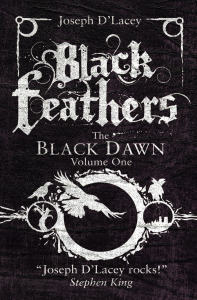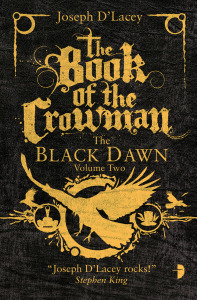National Poetry Month: Guest Post from Joseph D’Lacey: When Poetry Makes Prose
During a recent event at which myself and two other novelists were reading, fellow Angry Robot author, Rod Duncan, remarked his development as a writer had progressed like this:
Poet → Short Story Writer → Novelist.
“Aren’t all writers like that?” He asked me when we talked about it afterwards. Whilst I recognised a similar pattern of evolution in myself, I wasn’t at all sure it was a universal characteristic of fiction writers. It made me wonder if, perhaps, many novelists take a similar path but just never talk about it publicly.

Angry Robot, March 2013.
Rod’s casual statement was the first time I’d heard anyone else ‘admit’ to finding their genesis in verse and yet I identified with it entirely. In my case, poetry had been about testing the literary water, simply to see if I could swim. Dip a toe with a first line of rhyme, paddle up to the ankles with a couple of stanzas, perhaps chance a small wave going ‘above the knee’ with a finished haiku, limerick or villanelle.
For me, the game was all about levels of commitment. And I sucked at commitment in the beginning. Finishing a piece was always the goal, of course, but if you didn’t complete a work of poetry, who cared? Who even knew you were writing it? Back then, writing was a secret pursuit; like learning to swim on a private beach.
But even a sheltered, sandy bay isn’t completely safe. And the danger has nothing to do with who may or may not see you pathetically flopping about in the shallows. Water is magnetic. Come in, it says. Come deeper. Become part of me and I’ll show you my mysteries. Fortunately (in hindsight), I was as ill-disciplined with temptation as I was with commitment. Where’s the harm, I thought, wading brazenly to my waist, hitching in chill-shocked breaths all the while; and it was during these riskier baptisms that I found I was capable of some longer narrative verse.
Sometimes, though, I just sat on the shore and looked out, knowing the ocean was too vast too navigate and impossible to understand. The water terrified me; its depths promising only annihilation. But it never goes away, that mind-bending expanse of possibility, that literary ocean. It waits, eternal.
Without even knowing how I’d got there, I’d find myself wading again. Up to my chest. Swaying in the push-pull of the waves, feet momentarily losing touch, understanding what it means to give in to something far greater than myself.
One day in 2000, I wrote a short story called Getaway Car. It told of a terminally ill woman and the second-hand car she buys for a final road trip, only to discover the previous owner was an angel. The story was accepted on its first submission by a small, indie magazine called Cadenza.

Angry Robot, February 2014.
I glanced back and realised, with some alarm, that what I’d done had taken me quite a way from the beach. No floatation devices. No special breathing equipment. Swimming. Me. Swimming and splashing and laughing at what I could suddenly do. A few easy strokes took me back to the safety of the shore.
But the pull of this tide of words never decreases. All it ever does is intensify.
I knew, then, if I could write a short story, that meant I could write a chapter. And if I could write a chapter, well…With less and less trepidation about my feet not touching the bottom as I swam, I headed farther out into the darker waters and wrote my first novel.
Thirty years seems a protracted period of time to take over learning how to swim but I don’t regret how long it took me to attain the skill – how can you regret a thing that couldn’t have happened any other way? Thirty was the age when I became ready to learn. I’d tried writing stories prior to taking up poetry and I simply couldn’t finish a single thing I started.
For me, working in verse of all kinds has been both fundamental and crucial to my development as a writer. What I’m curious about is how many other people who now write full-length fiction, more or less exclusively, started out as poets. I’ll probably never know, but it would be great to get a show of hands next time I’m in a room full of novelists!
After all these years, I still don’t consider myself a strong or confident swimmer and the fear of what’s down there when I’m in the deeper water never leaves me alone. Sometimes, even now, I’ll spend months on the beach, just being near the water, just knowing that it’s there, but not venturing in.
There’s a tiny part of me, though, that knows I’ll always be drawn back to that immense, unknowable element. That I’ll enter it in order to explore, and all I’ll ever find is more and more evidence of my insignificance against its magnitude.
That same tiny part of me has a mad side too, something that has been altered by the unceasing pull of the tides, a side that yearns to swim out towards the fathomless ocean trenches with no thought of returning.

Joseph D’Lacey.
Joseph D’Lacey writes Horror, SF & Fantasy, often with environmental themes, and is best known for his shocking eco-horror novel Meat. The book has been widely translated and prompted Stephen King to say “Joseph D’Lacey rocks!”.
His other published works to-date include Garbage Man, Snake Eyes, The Kill Crew, The Failing Flesh, Black Feathers, The Book of the Crowman and Splinters – a collection of short stories. He won the British Fantasy Award for Best Newcomer in 2009.
He enjoys being outdoors, eating vegetarian food and was recently adopted by two cats.








